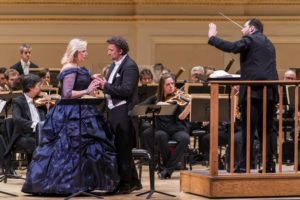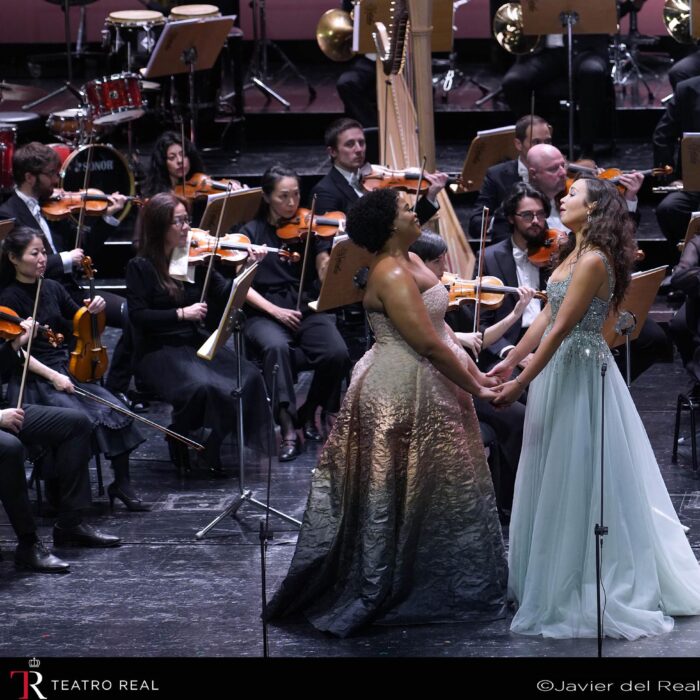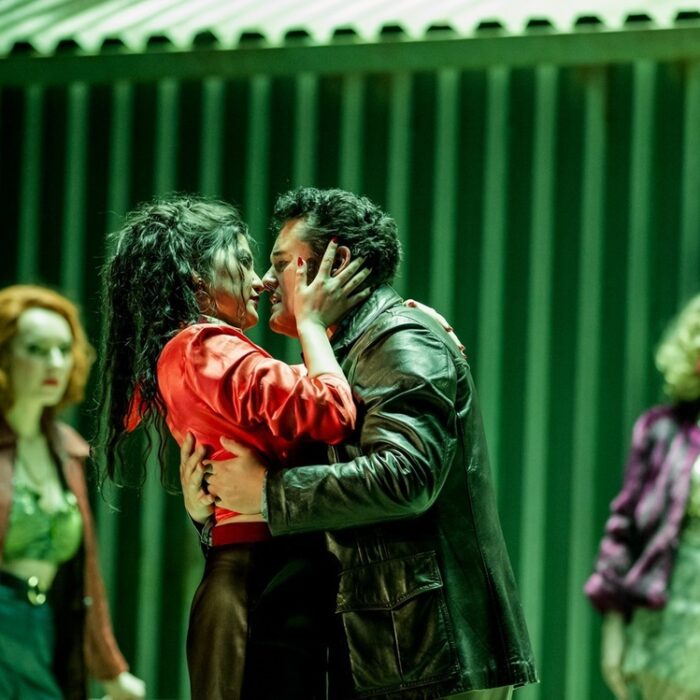
Carnegie Hall 2017-18 Review – Tristan und Isolde: Jonas Kaufmann Reminds Us of His Colorful & Nuanced Wagner Singing In Triumphant Debut
By Lois SilversteinAnticipation. Expectancy. The pulse of Act two of “Tristan und Isolde” in concert performance at Carnegie Hall.
Under the baton of Andris Nelsons, Ray and Maria Stata Music Director of the Boston Symphony, everything was set in motion – the lover galloping to his beloved, heralded by the offstage brass . The woman waiting with rapid heart-beat for his arrival. The warning of the lady-in-waiting of spies on them. The arrival of the king and the discovery of betrayal. All these beats coalesce in dramatic intensity as Nelsons led the international cast with lavish finesse.
Even in this Concert Performance, with only the single act and the addition of subtitles, we were spell-bound by the expressive and sonorous performance. Famed German tenor Jonas Kaufmann, singing his first Tristan, and well-known Wagnerian Finnish soprano, Camilla Nyland, singing Isolde, brought the roles to life, sans costume, lights, set design. Even the subtlest look brought the drama right into the audience. The English subtitles above the stage and the scores used by the leading singers did not diminish the impact one bit.
Of course, we cannot forget when we step into Act two that the lovers have been anticipating their meeting for a long time. Act one details the story, and by the time the off-stage horns signal the arrival of the hero racing to his beloved, we more than feel their erotic hunger.
Kaufmann entered with a powerful “Isolde, Geliebte,” in the stance of Otello or Radames, and Nyland responded in kind, “Tristan, Geliebter,” the two twinning words as they do in the subsequent dialogue delighting in finding each other finally in the flesh – a doubling that goes on musically throughout the first sequence and builds as the subsequent dialogues unfold. Wagner aimed to show the interchange of selves these lovers evince throughout this Act and, of course, later on as they move into their final union, beyond reason, beyond day. The music, the text, and their interchanges emphasize the shifting back and forth of their union as it builds to the climax. And Nelsons brought the music forth as if it were following their feelings rather than the other way around. It was thrilling.
Colorful Wagnerian Singing
In the Boston debut last week, the singers initially strained a bit to sing over the hefty sound, which, over the evening, was tempered. But in Carnegie Hall, the crisp sound of Nelsons’ musicians and the singers came out in powerful unison and reached the back of the auditorium with ease. Voices soared when needed and offered pianissimi when required. The two leads enthralled with each other and we were in thrall to them, as they traced their individual loves in the others. There was round and full-bodied exultation and subtle tender celebration, especially by Kaufmann who is known for his vocal palette of colors. One almost forgets, especially with his expansive Italian and French opera repertoire, how expressive and sublime a Wagnerian singer he is. The power of Tristan’s love was communicated phrase by phrase and we relished how he embodied a human lover as well as an archetypal hero. His baritonal tenor rings and alternately glows and caresses each word of love, emphasizing step by step tenderness while communicating vigor. Kaufmann captured, by careful recitation of syllable and endings of words, the building of tone so that without trying, we were under his spell.
His Equal
Nylund sings in equal measure, though thinner. Her timing and articulation were fastidious and she groomed her passion with aptness. More than the Boston performance, she stepped further forward in her role, present and personable to Kaufmann’s beckoning words. She turned to him, she smiled back at him. Their chemistry was palpable.
The subsequent sequences further elucidated Wagner’s lavish articulation of the score – but instead of the opening volume as initial coming together, Wagner shows them tunneling into more intimate feelings. Articulated ecstasy, Kaufmann’s “O sink herneider…” was an exquisite caress of tone, matching deeper and deeper feeling. Their sounds rose as if out of beyond, probably as Wagner wanted.
Wooing the Orchestra
Nelsons kept wooing his orchestra, the horns, the sweeping violins, like a great bird, hovering, coaxing, ever at the service of the music, which brought forth more and more the vortex of love, the life force of the whole performance. He aligned the musicians with word and story, song and substance with extraordinary tempi and volume. One bar melting into another almost effortlessly.
Brangaene, sung mightily by Japanese mezzo, Mihoko Fujimura, brought us into the handmaid’s wish to protect Isolde and the lover. Her rich mezzo swelled as she aimed to protect them, especially in the off-stage warning.
Marke, sung by German bass Georg Zeppenfeld, was haunting, thoughtful, and mournful, yet generous in sound as he ached with Tristan’s betrayal.
Melot, sung by Welsh tenor, Andrew Rees, came through with an appropriate sting. While he doesn’t sing much, his words are the lynchpin of the remaining action. Tristan himself is stung by the turnaround of Melot’s prior loyalty, while Kurwenal, sung by baritone David Kravitz evinced his own loyalty in his warning and the grief to come in Act three.
All Together
The Act two finale brought a dark and almost violent shift. Here is the culmination; here is where night meets light and comes down. Kaufmann’s Tristan shifted even further. Clear in his own guilt and his own “explanation” as being beyond reason, the tone of voice and the steadiness of posture, were full of conviction. Here was the descent of night into day, of passion into the light of restitution of its values. By the end of the Act, passion is not spent but channeled into another realm which he sustains with aplomb: his fate is inevitable, responsibility taken, and expectancy descending now into the demise to come. The ardent love dream, while not defiled, is defined, no longer boundless and infinite. We were stuck as Nelsons rang the sound like a resonant piercing of the whole. The death, the lovers proclaimed earlier, will turn from dream and aspiration into reality. Only, under Nelsons’ wand at Carnegie last night, did we not have it to endure.
Act three is yet to come, hopefully soon with Kaufmann in the lead role.


